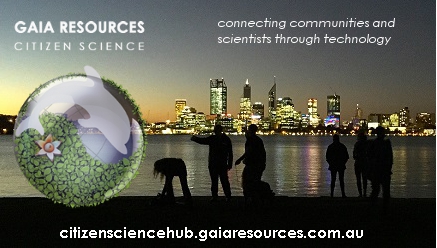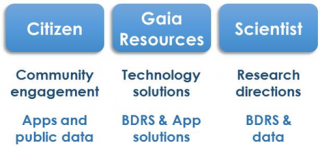This afternoon Alex and I fly out to Canberra for the inaugural Australian Citizen Science Association (ACSA) conference, where Gaia Resources is a gold sponsor.
We’ve been supporting the ACSA since inception here by providing free hosting for the ACSA web site, and I’ve been involved in the first workshop they held in Brisbane (see our blog for details of that past workshop). We’ve also been involved in the setting up of the organisation, and this conference will be a great start to the new Association, and we’re looking forward to supporting it into the future, as well.
At the conference, Alex and I will be giving three presentations – two posters and a paper – and one of the main ones we will be focusing on is the launch of our new Citizen Science Hub, now live at http://citizensciencehub.archive.gaiaresources.com.au/ (or http://tinyurl.com/citscihub if you prefer something shorter).
The aim of this hub is to provide a place to celebrate our citizen science projects and to provide more ways for the community to engage with scientists, and vice versa. Our role here is as an enabler; where we provide the solutions to help this engagement happen – be they mobile apps, the Biological Data Recording System (BDRS), WordPress plugins, training, hosting, ongoing support or program design assistance.
The new Citizen Science Hub website has been set up to help connect participants with projects, such as the ones we support, including:
- Bunbury Dolphin Discovery Centre,
- Coastal Walkabout,
- Discovery Circle,
- Dolphin Watch,
- Marri Canker, and
- Prawn Watch.
We’re also working on a few other projects at the moment, which will appear and be added to in the future.
We run a range of different internal citizen science projects, which we’ve also added to the Hub site. When we add these, it increases the volume of data quite considerable (looking at my own bird records, there’s a fair bit of time already invested there across the 17,000+ records I’ve logged!).
 The records in the hub – click on the image to go to the Participate page to investigate
The records in the hub – click on the image to go to the Participate page to investigate
We also aim to connect up the scientists and project proponents with the communities, and with the technologies to help this happen. We remain an independent solution provider so that we can put together the best tools for the projects at hand, and are looking at a range of existing and emerging technologies across the globe to better serve our clients. Our role as an enabler means we sit between the citizens and the scientists, and make sure the technology solutions meet the needs of both.
Importantly, we’ve aimed to keep the data free and open for people to use. Our projects have been more than happy to share data between them, and to contribute to this larger pool of data. Once we get the Atlas of Living Australia to harvest this data, it will be sent on to that repository, and from there to the international community including the Global Biodiversity Information Facility.
Over the course of the next three days at the ACSA Conference, Alex and I will be presenting, running workshops, posting our thoughts all across social media (for once, I might actually be using my Twitter account!), and generally having a ball meeting with everyone across the citizen science space.
Stay tuned for more announcements regarding the Hub and our work in this area.
Piers
Leave a comment below, or drop in on our Facebook, Twitter or LinkedIn sites.



Comments are closed.